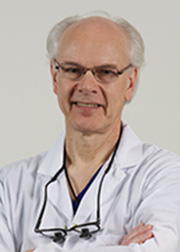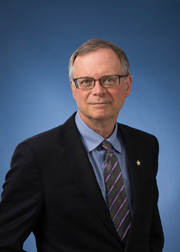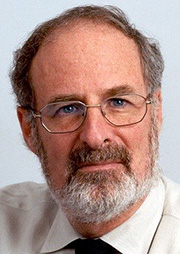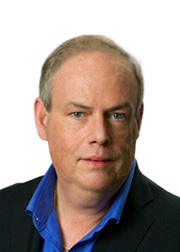Four pillars of the UHN Transplant community were bid a heartfelt farewell by colleagues, luminaries and staff as they retire within the next month and begin new lives exploring everything from cottage life to the science of happiness to playing in a blues-rock band.
Surgeon stars Drs. David Grant and Paul Greig are retiring by the end of April and May 2019, respectively, while Dr. Gary Levy, former medical director of the Multi-Organ Transplant Program, has retired from clinical practice, and Scott McIntaggart, former clinical director of the program and Toronto General Hospital (TG) Executive Lead and Senior Vice President, will retire at the end of May.
The farewell reception Tuesday honoured the "Fab Four" – as they were called throughout the evening – for their extraordinary accomplishments and dedication in helping build the program from one that transplanted 100 patients a year to among the world's best, now performing more than 600 annually.
In particular, Drs. Grant, Greig and Levy and Scott McIntaggart are linked to the Liver Transplant Program. Founded in 1985, it developed an integrated medical/surgical team approach, and in 2001 began performing living liver transplants. It's now the second largest liver transplant program in North America, and an international clinical, teaching and research hub, with applicants the world over vying for a coveted spot in its fellowship programs.
"Today, we are celebrating the accomplishments of these 'Fab Four' clinician-leaders who have done so much to innovate, build and transform the transplant program at Toronto General," said Dr. Atul Humar, Medical Director of the UHN Transplant Program.
"We thank each and every one of you for your dedication and enormous legacy which you have passed on to the next generation of physicians and leaders to build upon your achievements."
 Dr. Paul Greig A surgeon with a passion and talent for teaching and mentoring, he assisted in the first two liver transplants at TG in 1985 with the world-renowned Dr. Bernie Langer. A year later, he scrubbed in with Dr. Thomas Starzl, known as "the father of modern transplantation," for a liver transplant in Pittsburgh.
Dr. Paul Greig A surgeon with a passion and talent for teaching and mentoring, he assisted in the first two liver transplants at TG in 1985 with the world-renowned Dr. Bernie Langer. A year later, he scrubbed in with Dr. Thomas Starzl, known as "the father of modern transplantation," for a liver transplant in Pittsburgh.
Dr. Greig recalls those early, pioneering days in transplant at TG as invigorating, with physicians caring for the patients around the clock. For the first 10 liver transplants at TG, he and Dr. Levy took turns sleeping overnight in the Intensive Care Unit to ensure that the patients lived.
Dr. Greig subsequently headed the Liver and GI (gastrointestinal) Transplant Programs at TG, along with the HBP (hepatico-pancreato-biliary) and Transplant Fellowships. Bringing virtual reality to transplant, he co-developed the 3-D visual Toronto Video Atlas of Surgery, which is used as a teaching tool for surgeons and patients.
Dr. Greig is most proud of his role in mentoring 88 Transplant and HPB surgeons, who have gone on to practice and establish laboratories in more than 15 countries.
"It's a real sense of accomplishment to see how these young men and women grow and gain new skills in their two years with us," he says. "It's our way of sowing Canadian seeds in the HPB-transplant world and achieving global impact for UHN."
Having played the guitar since he was 16, Dr. Greig now plays in two blues-rock bands.
"I aspire to become a professional musician," he says. "I want to record, play regularly, and open for a band in the Danforth Music Hall."
 Dr. David Grant One of the most gifted surgeons of his generation, he excels at complicated and highly-specialized surgeries requiring detailed planning and the ability to persevere despite high risks and high stakes. For example, in London, Ont., he performed the world's first liver-small bowel transplant in 1989, which even today is still a relatively rare procedure. Later, with his colleagues, Dr. Grant transplanted the liver, bowel, stomach and pancreas into a five-month-old infant, the world's youngest recipient of a multi-organ transplant.
Dr. David Grant One of the most gifted surgeons of his generation, he excels at complicated and highly-specialized surgeries requiring detailed planning and the ability to persevere despite high risks and high stakes. For example, in London, Ont., he performed the world's first liver-small bowel transplant in 1989, which even today is still a relatively rare procedure. Later, with his colleagues, Dr. Grant transplanted the liver, bowel, stomach and pancreas into a five-month-old infant, the world's youngest recipient of a multi-organ transplant.
On the verge of being recruited to one of the prestigious transplant centres in the United States, Dr. Grant was coaxed into joining the transplant program at UHN. There, he and his colleagues in the Liver Transplant Program, developed it into an international destination for clinicians, visiting professors, and fellows.
Dr. Grant co-developed and refined the living donor liver program into what is now the premier such program in the Western world. Recently, he and his team spearheaded the first North American paired living liver donor exchange, with two anonymous living liver donors and two recipients – along with a team of 28 staff and surgeons performing the four surgeries in 12 hours.
He also developed the anonymous living liver donation program into the largest one in the world with 58 anonymous donors since 2005. He especially paid meticulous attention to the ethical concerns of why we should operate on donors with no biological relationship or emotional bond to the recipient, despite the significant risks to them.
Dr. Grant says he got tired of seeing liver patients die while waiting for a transplant, so he put a great deal of his energy and thought into making living donation a safe option for those willing to do it.
"I have the utmost admiration for living donors," he says, "That's why it is so important to shout out to the world how life-changing and important this gift is."
Dr. Grant will be spending part of the year in Nova Scotia, putting into practice Yale's famous science of happiness course.
 Dr. Gary Levy As one of the founders and second Medical Director of the Multi-Organ Transplant Program, Dr. Levy's aim has always been to develop a strong research program and integrate that into clinical practice to help patients.
Dr. Gary Levy As one of the founders and second Medical Director of the Multi-Organ Transplant Program, Dr. Levy's aim has always been to develop a strong research program and integrate that into clinical practice to help patients.
He remembers the stories his University of Toronto (U of T) teachers told him about patients dying from liver disease. "That pushed me to try and understand the mechanisms of disease so that we could improve treatment for patients with end stage organ failure.
"I'm proud of the amazing people I have worked with throughout the years, and all the people I have trained. Many of them are now leaders in transplantation the world over."
In a bold move in 1990, Dr. Levy united separate transplant programs in kidney, heart, liver and lung within the hospital – a first in Canada. He also partnered with four teaching hospitals, including Toronto Western, St. Michael's and SickKids.
This approach of sharing knowledge amongst different specialties for better outcomes is now recognized and modelled world-wide for its quality patient care and excellent outcomes, and is the gold standard in educating the next generation of clinicians.
In keeping with his focus on collaboration and creating a hub of excellence in Ontario, in 2009, Dr. Levy created the first University of Toronto Transplantation Institute with the U of T and hospital partners (SickKids, Sunnybrook and St. Michael's), where international researchers and students learn about and create interdisciplinary research projects "without borders."
In his own research and practice, Dr. Levy has made seminal findings in immune mechanisms, established UHN's robust living liver donor program to improve access for patients who need liver transplants, pioneered treatments to reduce or eventually eliminate immunosuppressive medications, and explored the possibility of stem cell therapies.
As well as Dr. Levy's many academic and administrative achievements, he continues with his research program in tolerance to reduce long-term need for immunosuppression, and still plays an active role in increasing public awareness about organ donation, and the role each of us can play in helping others who need life-saving organs.
 Scott McIntaggart A nurse, he was the Nurse Manager of the Liver Transplant Unit, which, with other organ groups, became the Multi-Organ Transplant Program. Scott then became Program Manager and Clinical Director of the program for more than 10 years. He is a certified Health Executive, and the Senior Clinical Vice-President and Executive Lead at Toronto General Hospital.
Scott McIntaggart A nurse, he was the Nurse Manager of the Liver Transplant Unit, which, with other organ groups, became the Multi-Organ Transplant Program. Scott then became Program Manager and Clinical Director of the program for more than 10 years. He is a certified Health Executive, and the Senior Clinical Vice-President and Executive Lead at Toronto General Hospital.
Scott has been at the forefront of leading and helping teams achieve positive outcomes – such as creating a blame-free culture of safety where everyone feels confident to speak up for safety, decreasing Emergency wait times and encouraging the use of prevention bundles at the point of care, which decrease complications after surgery.
Scott and his team have encouraged a learning environment, helping units to stay focused, positive and engaged through changing times. TG retreats have showcased how creative units are in practicing resilience and optimism – from creating a Happiness HAC (hospital-acquired condition), to practicing gratitude, to reading thank you cards out loud at unit safety huddles.
To help build resilience, he introduced TG's first and continuing art exhibit, showcasing the creative works of staff.
"We have to rejuvenate ourselves in ways that create optimism and serenity," Scott says. "We have to build ourselves back up in order to go back in to that hectic environment where we are constantly giving of ourselves."
Leading system transformation by developing new models of care is a key strength of Scott's, and he has sponsored innovative projects such as Hospital at Home. To ease capacity pressures and provide seamless care, this new way of delivering care substitutes a portion of the hospital stay with acute care services delivered in the home.
In addition, Scott has encouraged partnerships with community agencies such as Woodgreen, Hillcrest Reactivation Centre and the Toronto Grace Centre to help with patients who can be discharged from the hospital, but are not yet ready to go home.
Scott has also been a strong champion of developing and strengthening hospital-wide systems to enhance patient engagement, such as Partners in Care, increase organ and tissue donation, develop an energy conservation workplace, hone our environmental emergency response and improve patient flow.
He was a pioneer in helping TG develop the Partners in Care Service Standards to promote a culture of service excellence for patients, families and staff. UHN values reflect many of these standards, such as compassion, teamwork and integrity.
Scott plans to spend lots of time at his cottage near Midland, landscaping, taking nature photos and hiking.
